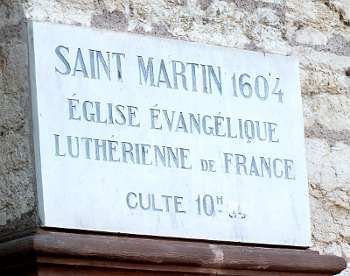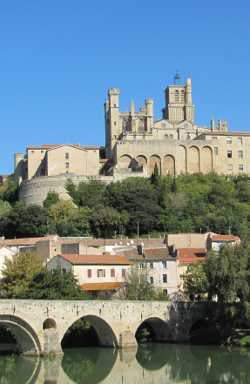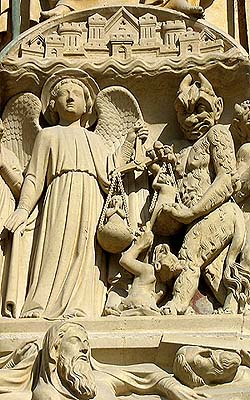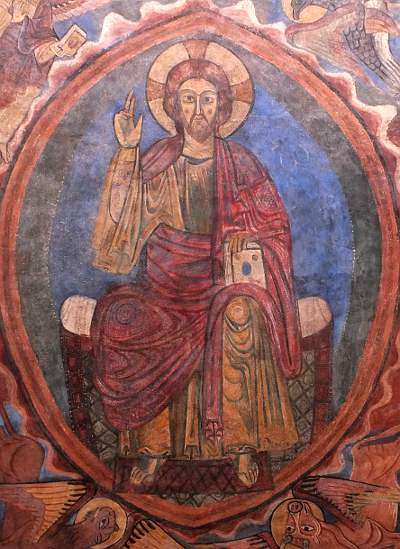

Religion in France
Religion
in France, past and present
- Explore France ►
- Essential pages
- Travel in France
- Where to go
- What to see and do
About-France.com
- the connoisseur's guide to France
Religion
in France
| Go to ► | Historical background | Religion in France today |
| Islam | Protestantism in France | Christian cultural heritage of France |
See also: Great medieval cathedrals in France (with information about the Notre Dame de Paris fire).
Historical background
For most of the past thousand years, France has been one of the principal "Catholic" countries of Europe.From the time of Charlemagne until the emergence of Protestantism in the sixteenth century, France was one of the main powers in a continent where Catholicism was - except in orthodox areas - the only mainstream form of Christianity. After that, most of France, and particularly the French monarchy, maintained the Catholic faith while many other parts of Europe, including England, Switzerland, the Low countries, and much of Germany and Scandinavia, adopted differing forms of Protestantism.
After the French Revolution in 1789, religion in France was brought under state control, discouraged as anti-revolutionary, and monastic orders were abolished. But in 1801, Napoleon signed a Concordat with the Vatican, which restored much of the church's former status.
For most of the nineteenth century, France was officially a Catholic country; but in 1905 the landmark law was passed, establishing the Separation of the State and the Church. Since then, while Catholicism has remained the predominant religion in France, the Catholic church is constitutionally just one among many religious structures in the country. The "secular" (in French laïc) state recognises the right of individuals to practice whatever religion the wish, and in today's France, Catholicism exists alongside Protestantism, Islam, Buddhism, Judaism and a number of fringe cults. France today is a secular state which is tolerant of all religions.
Religion in France today
Today, while Catholicism has far more adepts than any other religion or religious denomination in France, the time when the vast majority of Frenchmen considered themselves to be Catholics is now long gone. Slightly less than half of the French population now call themselves Catholics. An Ipsos/MORI poll in 2011 showed that 45% of French people claim to be Christians - most of them Catholics - while 35% claimed to have no religion, and just 3% proclaimed themselves as Muslims.Church attendance in France is among the lowest in the world, with surveys showing that only about 5% of the total population, i.e. less than 10% of those who are nominally Catholics, now attend weekly mass.... Yet it is an undeniable fact, underlined by former president Sarkozy, that France remains a country whose "culture" is catholic.
With laicité or secularism seen today as one of the cornerstones of the identity of the French republic, it follows that the position of religion in public life is very limited, notably compared to its role in public life in Britain or the United States. While politicians in Britain or the USA often go out of their way to be photographed in the presence of religious leaders, and great national events, particularly in Britain, are marked by religious ceremonies, this is not the case in France. Even when they are practising Christians – and that is not the case for any member of the French government in 2013 – French public figures in recent times have generally tended to keep the fact out of the public eye.
In recent decades, one fairly unique exception of a leading French politician who was also well known as a practising Catholic was Jacques Delors, former Socialist finance minister and later President of the European Commission. Delors' daughter Martine Aubry, until recently First Secretary of the Socialist party, was brought up in a strong Catholic tradition but is no longer a practising Catholic. And under the Fifth Republic, three Prime Ministers, Maurice Couve de Murville, Michel Rocard, and Lionel Jospin, have been Protestants - though this was never much commented upon.
In the state education sector, religion and religious matters are frequently considered taboo subjects; however, in recent years this sidelining of religion has been questioned in the face of the increasing number of Muslims in modern France. While there are no religious education classes in French state schools, and no acts of worship, national programmes now state the requirement to make pupils aware of the religious aspects of French history art and culture.
For parents who want their children to receive religious education, this can be achieved outside school hours in the state sector, or by sending children to be educated in private schools, most of them run - at least in principle - by the Catholic church. About 18% of France's school children are in "confessional" schools, most of them Catholic; the figure rises to 40% in Brittany. At high school level almost a quarter of students are in private schools, and Catholic high schools still tend to be over-represented among the most successful high-schools in France.
The exception of Alsace
In spite of France's asserted republican unity, the relationship between the state and the church is different in the region of Alsace and the department of the Moselle. Here, priests are paid by the state, and religious education is part of the curriculum in state primary schools and middle schools (collèges). Paradoxically, or perhaps because of this, Alsace is now the region of France with the lowest proportion of schoolchildren educated in the private (confessional) sector. There is also a faculty of theology at the university of Strasbourg - the only French state university to have one.When in 1882 Jules Ferry took religion out of the school curriculum in France, Alsace and the Moselle were at the time attached to Germany. These areas became French again in 1918, but kept some of their own laws, including the concordat between the state and the church, dating back to the early nineteenth century.
Protestantism in France
 Protestantism
has a long history in France. In the Middle ages, before
"Protestantism" as such was founded, a large area of southwest France
rejected Catholicism and went over to a non-hierarchical type of
Christianity known as Catharism. Catharism
was stamped out in the 13th century by the bloody Crusade against the
Albigeois – the only medieval Crusade not directed against
Islam.
Protestantism
has a long history in France. In the Middle ages, before
"Protestantism" as such was founded, a large area of southwest France
rejected Catholicism and went over to a non-hierarchical type of
Christianity known as Catharism. Catharism
was stamped out in the 13th century by the bloody Crusade against the
Albigeois – the only medieval Crusade not directed against
Islam.At the time of the Reformation, many areas of France took up the Protestant Faith; though discouraged, Protestantism was tolerated, and in 1598, King Henry IV - himself a former Protestant converted by necessity to Catholicism in order to take up the crown of France - issued the Edict of Nantes, guaranteeing freedom of religion and conscience to France's many Calvinist Protestants, known as Huguenots. Many areas of France, notably in the southwest, moved over to Protestantism. Cities like La Rochelle became major bastions of Protestantism in a country that was officially Catholic.
However in 1685, Louis XIV revoked the Edict of Nantes, and precipitated a mass emigration of Protestants from France. Though precise figures vary, it is estimaged that at least half a million Protestants left France in the ensuing years, to take up residence in Britain, North America, Switzerland and the Low countries: and among those that left were a large number of skilled workers - bankers, watchmakers, craftsmen, shipbuilders and many other professions - whose migration enriched the countries they emigrated to, while damaging the French economy.
In the 18th century, notably after the death of Louis XIV, Protestantism slowly reestablished a presence in some areas; it was finally officially tolerated again, on a par with other religions, after the French Revolution.
Today, while there are Protestants in all areas of France, Protestantism remains most present in two areas, the Alsace and North-Franche-Comté area of eastern France, and the Cevennes hills in the south. The former area, close to Germany and Switzerland, was much influenced by the Protestantism across the border; the latter was a mountainous area that even the Revocation of the Edict of Nantes failed to bring back fully into the fold of Catholicism.
Islam in France
There are no precise figures, but estimates suggest that there are between 6 and 7 million Muslims in France, about 8% of the population. About a third of these, just over 2 million, are practising Muslims – compared to over 10 million practising Catholics. Most French Muslims are of North African origin, descendents of people from France's former colonies of Tunisia, Algeria and Morocco; though in terms of nationality, many today are third or fourth generation French citizens.According to research by the sociologist Samir Amghar, reported by Le Monde newspaper, there are between 12,000 and 15,000 "Salafists" or radical Muslims in France; but only a tiny minority of radical Muslims share the views of so-called "Islamists". French Interior Miinister Bernard Casenave is quoted as saying that just about 2000 of France's Muslims share the views of the most radical forms of Islam – or 0.075% of France''s Muslims.
The number of mosques in France has increased sharply in France since 2000, and today there are over 2000 - most of them very discreet.
As for education, according to the French ministry of Education, there are 30 Muslim schools in France, compared to 282 Jewish schools, and 8485 Catholic schools. Only two of the 30 Muslim schools are fully contracted into the state system; the others are private schools. Most young Muslims in France are educated in non-confessional public schools.
The wearing of the "burqa" or "niqab" , face-hiding veils worn in some Islamic countries, is forbidden in public places in France. This is part of public security legislation which outlaws the hiding of a person's identity in public places, by any means.
In public schools (but not in universities) the wearing of "ostentatious signs of religion" is prohibited. This applies to all religions.
Religion in French culture
Christianity and the Catholic tradition have fundamentally marked French culture since the birth of the French nation. The finest monuments of medieval France were not its castles and palaces, but its great cathedrals, and in places, even its small churches. The finest artists and craftsmen of their day were hired to paint frescoes and altarpieces, create wonderful stained glass (See slideshow: Bourges cathedral) and carve the most exquisite sculptures inside and outside of churches (See slideshow: Romanesque sculptures at Conques).Most medieval French music was written for and performed in churches, and much literature was a celebration of Christian faith. The great founding work of literature in the French language was the Chanson de Roland, the epic of a heroic fight of Christians against the Sarrasins, led by Roland, nephew of the emperor Charlemagne. Much medieval litterature was steeped in the religious tradition, and in France the popular medieval Arthurian legends were strongly in this tradition.
French Renaissance art and literature are rooted in the Catholic culture of their age. Even the popular Rabalais, the greatest humourous writer of his age, was a Franciscan friar, before turning to a life of writing; his famous novels, Gargantua and Pantagruel, best remembered as comedies, are also works that question the meaning of life, in an essentially Christian view.
Until the age of Enlightenment in the 18th century, questions of Christian theology were the great issues that divided opinion in France, as in the rest of Europe; but from the 18th century on, in France as elsewhere in Europe, thinkers of the Enlightenment moved the arguments on to new areas, replacing arguments about which form of religion was best, with discussions about the nature of man, the nature of authority, and of society. Yet the discussions of the Enlightenment were themselves born out of the great debates about religion, that began with Martin Luther and the Protestant schism. The great French thinkers of the Enlightenment, Descartes, Rousseau, Voltaire and others, were all products of the Christian culture into which they were born. Even Voltaire, frequently cited for his attacks on religion, was not an atheist. He was a "theist", who came to believe that religion was an intensely personal matter - not something to be organised by churches.
The Revolution's attempt to replace Christian culture with a new revolutionary culture, failed; and Catholicism - or reactions against it - dominated French art, litterature and music in the nineteenth century. While religion itself was not the theme of much major painting or literature (though plenty of minor works), it did inspire many of 19th century France's great composers, notably Fauré, César Franck, Widor or Berlioz, who wrote major works of sacred music. In literature, Balzac, the century's greatest novelist, was strongly marked by his Christian culture; his portrayal of life in nineteenth century France, la Comédie Humaine (with its title nodding back to Dantë's Divine Comedy) is that of life in a profoundly Catholic national tradition.
In the twentieth century, the quest for national identity in France, following defeat in the Franco-Prussian war of 1870, the ravages of the First World War and the rise of Communism in Russia, led to an upsurge of Catholic consciousness among French writers. Maurice Barrès, Léon Bloy, Paul Claudel, George Bernanos, Henri de Montherlant and François Mauriac are just half a dozen among the greatest French writers of the twentieth century, who were strongly inspired by their Catholic beliefs.
There have also been great French Protestant writers, notably André Gide and Pierre Loti.
But more important than the individual writers, musicians and artists whose works were directly inspired by personal religious beliefs, is the fact that French culture in general - even that of modern-day atheists - has always been, and still largely remains, firmly anchored in a Christian cultural and philosophical tradition that - in its modern form - owes everything to the ethos But more important than the individual writers, musicians and artists whose works were directly inspired by personal religious beliefs, is the fact that French culture in general - even that of modern-day atheists - has always been, and still largely remains, firmly anchored in a Christian cultural and philosophical tradition that - in its modern form - owes everything to the ethos of the Enlightenment and the Christian and Catholic cultural traditions out of which it sprang.
The secular state
Secularity (la laïcité) is a cornerstone of modern France. This means that religion takes virtually no part in public life. While in the UK and many European and American countries major national events such as memorial days will involve political leaders of all persuasions taking part in a church service or a mass, this does not happen in France. Similarly, church dignitaries in France rarely attend the kind of official events which in many countries would be attended by church leaders as well as civic leaders. The only occasions when political or civic leaders participate in a religious ceremony tend to be weddings and funerals, when these take place in church.It is worth noting however that since the church in France has no civil authority, church weddings can only be ceremonial events. The actual legally binding wedding takes place in the local Mairie, or town hall, and is carried out not by a priest but by the mayor.
About-France.com
Home
page - Site search
- Regions
- Maps of France
Compare: ► Religion in the United States
True
or false?
- France is a Catholic country.
True - Catholicism is the official religion in France.
False

The fortified church area at Béziers bears witness to the turbulent history of religion in France
About-France.com
is an independent user-supported website that does not track visitors
and carries very little advertising, Links
to carefully selected affiliate
partner websites may generate commission on sales at no cost
to the
user.


Medieval sculptures on the entrance to Notre Dame Cathedral
